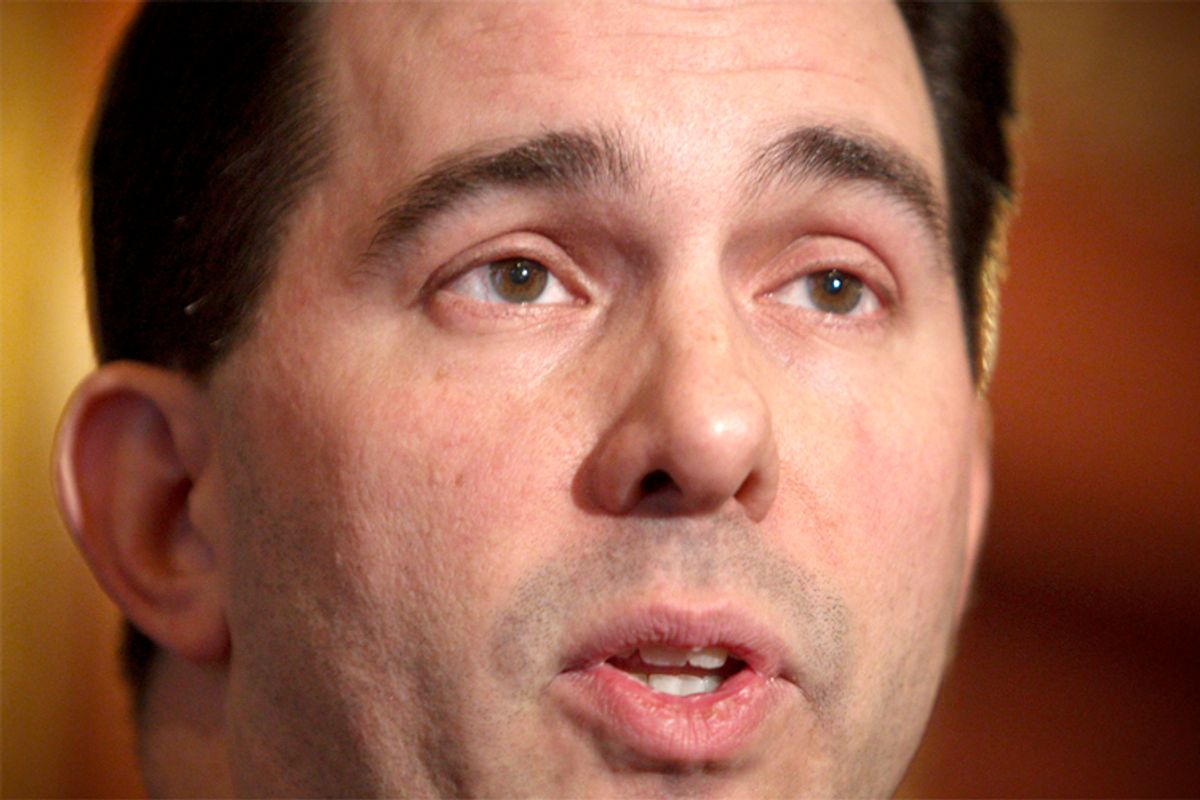Take that, racial progress! In a stealthy move Thursday that received little national attention, Wisconsin Governor Scott Walker signed a bill that will make it harder to get offensive school sports team and mascot names changed.
Under previous law, a public school with a tribal-themed team name could come under state review after a single complaint. Now, a petition signed by a stunning ten percent of a district's population and proof that the nickname or mascot is "discriminatory" will be required before lawmakers will consider requiring the school to make a change. Walker sent a letter Thursday morning to state tribal leaders saying he "shares concerns about tribal mascots and nicknames" but "is worried current state law infringes on free speech." The new ruling goes into effect Saturday.
The controversy over team and mascot names -- the argument that maybe ethnic stereotypes aren't a hot way to celebrate sportsmanship, has been going on for years. The Atlanta Braves retired their mascot Chief Noc-A-Homa in the eighties -- although he's been known to reappear from time to time. In 2009, the Cleveland Indians began a phase-out of their cartoony mascot Chief Wahoo from their batting helmets and jerseys. Now, as Marc Tracy noted in the New Republic this fall, the Chief "has vanished from all 2014 batting practice and spring training uniforms, as well as season-ticket brochures." You can still find him at the team's shop, however, and over in Atlanta, the legendary tomahawk chop tradition is still revered as "a magical moment" among fans. This year, the Washington Redskins have come under particular fire for the team's continued use of a name that ten members of Congress have officially called a "derogatory slur" -- especially after team owner Daniel Snyder firmly declared, "We’ll never change the name. It’s that simple. NEVER — you can use caps."
For a team to have a Native American name or mascot does not automatically make it offensive – nor is there ever any universal consensus on what constitutes offensiveness. (If there were, we wouldn't have to keep having arguments about rape jokes.) A 2004 Annenberg poll revealed "9 out of 10 Native Americans said they were not bothered by the name the Washington Redskins." And Florida State's Seminole mascot is sanctioned by the Seminole tribe. Native American culture is American culture, and as such, is reflected throughout it – from place names to sports teams. But there's a difference between honoring history and perpetuating stereotypes.
Change takes time and requires effort -- two great enemies of the status quo. In Wisconsin this year, Mukwonago Area School District refused to honor a previous order to change its Indians nickname, explaining that the name has existed for 80 years and would cost $100,000 to change. The Associated Press notes that "Republican Representative Stephen Nass, who represents a portion of Mukwonago, introduced the [new] bill in August to help the district." Walker meanwhile has deployed the slippery slope argument that "If the state bans speech that is offensive to some, where does it stop?" It's an absurd one. Making it easier for members of the community to ask the state to look into an issue is not the same as the state taking it upon itself to impose a limit on free speech. Walker's mere phrase "offensive to some" groans with privilege. "Offensive to some" says, "But not me!" It says, "So what's the big deal? What are you getting so sensitive about?" It yawns that making things different and better is more trouble than it's worth. And as Barbara Munson, chair of the Wisconsin Indian Education Association's mascots and logos task force, Thursday's move is "an example of institutionalized racism in content and process."



Shares